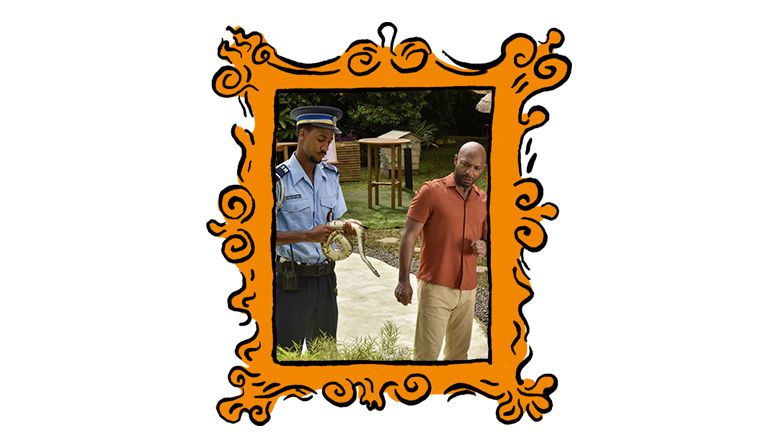Death in Paradise is saccharine, undemanding, and—if you can lay aside cynicism—utterly unmissable. Every winter since 2011, the show has transported us to the fictional Caribbean island of Saint Marie, a land of beautiful sunsets, welcoming locals, and—whenever we’re there—murder. It’s easy-going escapism, a fright-free thrill, a cup of cocoa for a cold night.
The show is a gentle behemoth. It draws about eight million people an episode, is the UK’s most-watched returning drama and is broadcast or streamed in 230 territories. Viewers love the set, the characters and the tone (the grittiest thing about Death in Paradise is the dirt track to the inspector’s beach house).
This naive jollity sits alongside many predictable Caribbean tropes—rum, reggae (or ska) and a culture of “taking it easy”. The show has long been generous with cliché, but—now embarking on its 14th season—is it about to dovetail into stereotype?
Big changes are afoot. For the first time in the show’s history, the sleuth is black. He’s DI Mervin Wilson (Don Gilet) and he started solving the island’s crimes during the Christmas special. Wilson, who was visiting Saint Marie to search for the mother he never knew, was originally drafted in to help the team solve a double murder.
Death in Paradise has a knack for changing its detective and junior officers long before they go stale. But rather than keep the show fresh, the arrival of DI Wilson (or rather, the way he is portrayed) could turn it sour. First, there’s the timeworn trope of a black person who has no meaningful relationship with one of their parents. Then there’s some rather unimaginative characterisation: Wilson is not merely the show’s only black DI but the most working class—a man who calls his London-based boss “Guv”.
In truth, Death in Paradise has always been on the edge of patronising its black characters. The premise for the show is that this black-majority island, which may be a British Overseas Territory, needs a detective from the imperial centre. What’s more, that male British detective has a black female detective sergeant who is either from Saint Marie or another part of the Caribbean. Although these deputies are always intelligent, resourceful and have more local knowledge than the Brit, they aren’t trusted to run the team or decipher the mystery. And despite the regular staffing challenges faced by the Saint Marie police, they don’t enquire about the top job.
Perhaps none of this is of great importance. After all, Death in Paradise is light entertainment, not serious drama. It might also be pointed out how rare it is to have a primetime, nationally beloved series in which black actors are in the majority. Don Warrington, who is brilliant as Commissioner Patterson, and is also the show’s elder statesman, told the Radio Times that “a black lead in the most popular show on the BBC is a wonderful thing”.
Visibility is important, but what also matters is what happens behind the camera, in the writing room, in the edit suite. The show has had many black characters, but they’ve rarely had the well-constructed, individualised storylines that would make them multifaceted personalities. An actor who has appeared in Death in Paradise told me, on grounds of anonymity, that the show’s “apparent popularity among black audiences seems like a confusion between visibility and true representation”.
The hope is that DI Wilson will be more rounded. This could prove to be the case. Although he is impolite and has big-city impatience, he also has a softer side—as seen in his search for his mother. He may also bring a dissenting voice. Intriguingly, he is the first detective to question Commissioner Patterson on why the Saint Marie police (and the show itself) insist on gathering the suspects to hear the detective solve the case:
DI WILSON: Can’t I just write it up in the case file?
COMMISSIONER PATTERSON (with a knowing smile): Let’s say it’s a matter of tradition.
It’s a nice piece of self-aware scriptwriting—a recognition that, although this type of ending adds suspense, it is utterly contrived. The “gather the suspects” ruse may be suited to the confined settings of Agatha Christie (the country house, the Orient Express, the Nile cruise) but it makes little “real-life” sense when the suspects aren’t staying or living together.
Those finales are typical of the show at large—the genius detective saves the day, the suspect willingly leaves in handcuffs and there’s a sunset with cocktails. No wonder the series, which began during the austerity of the coalition government, flourishes in today’s age of economic uncertainty, global political turmoil and climate crisis.
Death in Paradise has captured and fomented the public’s appetite for cozy crime. It can be quaint, charming and soothing. All you need to do is suspend disbelief.









